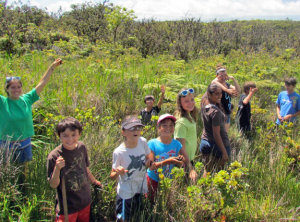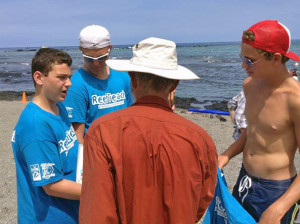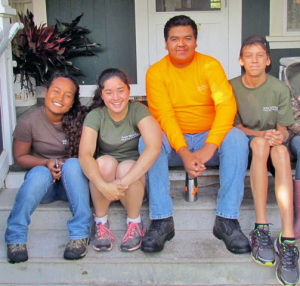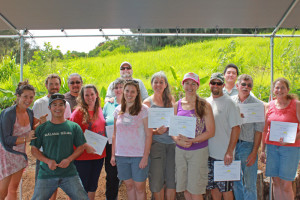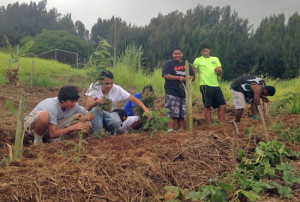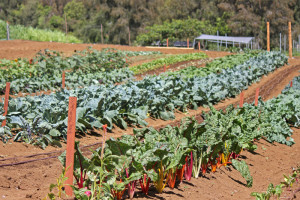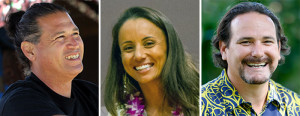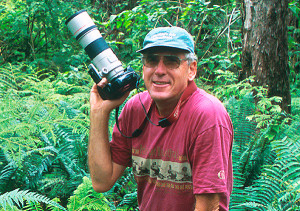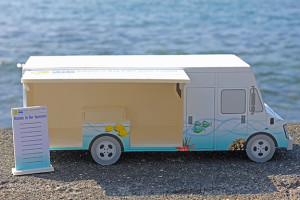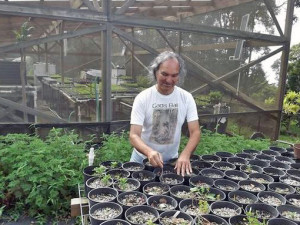Hawai‘i Island is a dynamic classroom rich in history, culture, and traditional knowledge that teaches us how to live in balance with nature and practice aloha ‘āina—love of the land—through thoughtful leadership, sustainable agriculture, environmental stewardship, and the generation of new knowledge about our eco-cultural landscape. In this issue of The Leaflet, we highlight our hands-on youth summer camps and internships, the progress of our beginning farmer training program, how we’ll soon reach and educate even more visitors at Kahalu‘u Bay, our upcoming Hawai‘i Farm to School Conference, and more.
IN THIS ISSUE:
Summer fun in the sun grows youth leaders from mauka to makai
Training and inspiring Hawai‘i’s future farmers
Hawai‘i Farm to School Conference to address locally grown food in schools
Fall Book Talks and Spring Nature Walks announced for Circle of Friends
Kahalu‘u Bay Education Center exceeds fundraising goal
Microloan program launched to support Hawai‘i Island food producers
Summer fun in the sun grows youth leaders from mauka to makai
For most kids, summer is a liberating season free from school bells and homework, a time to sleep in and relax on the beach. But for more than 80 students, this summer included participating in one of The Kohala Center’s youth leadership programs, exploring the muddy forests of Kohala Mountain, snorkeling with reef fish and endangered sea turtles, and asking scientific questions about watershed interactions.
Waimea Nature Camp
The mission of the Kohala Watershed Partnership’s (KWP) Waimea Nature Camp is “to develop in our children an ethic of stewardship for our natural resources by engaging their minds through natural science and touching their hearts with the power and beauty of nature.” With only one month to accomplish this goal, KWP coordinator Melora Purell and two camp leaders hit the ground running from the very first day. Through play, crafts, and exploration, all set in the outdoors, young campers learned the values of equality, service, peace, and respect.
The camp, founded in 2006, is open to 2nd through 8th graders. “The large age range was chosen on purpose,” Purell said. “We make the group feel like a family. The one rule at Nature Camp is that everyone is equal. There is no hierarchy. The program is not about following rules or staying in line. After a couple days, the kids get it, and it’s like magic: everyone is playing together and using their imaginations, no matter how old or how young.”
The summer camp uses exploration in nature to teach kids key environmental concepts. For example, one day is spent learning about the source of Waimea’s water, with campers taking a field trip to a bog high up Kohala Mountain and discussing how Waimea’s water originates from the forest. By observing firsthand the differences in water-holding capacity of a bog with native plants versus a bog taken over by invasive ginger, they learn about the threats to the water cycle. “Everything is experience based, because that’s the best way to reach 7 to 13 year olds,” Purell noted. “We teach them about native forests by giving them opportunities to explore, play, and learn in them. The joy of stomping around and getting dirty in the forest is a real, tangible experience they can tap into in the future.”
The knowledge kids gain at Waimea Nature Camp often rivals classroom instruction. At the end of each day, most campers would share their experiences with their families, then return the next day with advanced scientific questions beyond their grade levels. The camp also has a more significant impact on kids beyond the science that’s taught: they also become better stewards of natural resources. Purell believes the camps connect with kids not just academically, but emotionally as well. “It’s very simple: you are going to take care of what you love.”
Wilderness Ventures and Bold Earth Adventures
While Waimea Nature Camp offers kids a mauka (upland, toward the mountain) perspective, Kahalu‘u Bay Education Center (KBEC) hosts makai (seaward)-side experiences for two different youth summer programs: Wilderness Ventures and Bold Earth Adventures. These two independent programs for students ages 14-18 aim to develop a sense of responsibility, self-confidence, and tolerance in their participants through meaningful outdoor experiences. All of the teens in both programs are visitors to Hawai‘i Island, coming from the continental United States as well as places as far away as Guatemala, China, and Italy. During their summer programs the teens surf, canoe, and backpack their way around Hawai‘i. While much of their time in the programs is spent in adventurous exploration, working with KBEC serves as the teens’ opportunity to give back to the very island that gave them a summer full of life-changing experiences. The teens spend two to four days with KBEC, starting with a brief classroom training in which they learn about the coral reef ecosystem, interactions between marine organisms, and how people can protect fragile underwater environments. Afterwards, they embark on a snorkel tour of Kahalu‘u Bay, observing some of Hawai‘i’s most diverse marine life. The rest of their time at KBEC is spent volunteering as ReefTeachers, sharing their newly acquired knowledge with Kahalu‘u Bay visitors and encouraging snorkelers to be good stewards of the reef by respecting marine life and not stepping on coral.
The service component facilitated by KBEC brings a unique and essential element into the youths’ summer experience—one that helps them develop a sense of environmental stewardship and responsibility. According to Matt Connelly, KBEC Volunteer Coordinator, “The kids can’t wait to get in the water and see the corals, fish, and turtles for themselves. Once they connect with the bay’s ecosystem, it’s easy for them to share their enthusiasm with other Kahalu‘u visitors.” The teens also track the behavior of those they talk to about reef stewardship; in most cases they see positive, reef-friendly behavior change immediately. “Visitors tend to be receptive and inspired when they see young people doing their part to protect the reef,” Connelly said.
In between ReefTeach shifts, KBEC also leads participants in water-quality data collection, Hawaiian basket-weaving lessons, and tide pool explorations. The teens who are lucky enough to spend more than two days at Kahalu‘u also have the opportunity to see and learn about the nearby heiau (ancient Hawaiian temple) and culturally significant fishponds. The most important thing KBEC teaches program participants, however, is that the health of our oceans affects the health of the entire planet, which impacts everyone. This is a critical lesson, especially for kids who aren’t raised near the ocean. KBEC believes the best way to promote societal behavior change is by educating youth. “We teach them that the ocean is in peril from human activities, and that it is our responsibility to do what we can to protect it,” Connelly said. “We can influence these young people to be responsible citizens. Engaging them is really important to ensuring a bright future for corals, fish, our oceans, and ultimately our planet.”
Teen Leadership Program
By far the most intensive of all of The Kohala Center’s summer programs for youth is KWP’s Teen Leadership program, which is targeted towards highly motivated teens who wish to pursue careers in science or conservation. The rigorous two-month program exposes these high school students to the many facets of natural science and conservation careers. Teen leaders have opportunities to collect data with researchers, work alongside the KWP field crew, and lead the younger kids in the Waimea Nature Camp. Purell also heads the Teen Leadership Program and gives the teens the power to direct their own summer experiences, asking them to choose the components on which they want to spend the majority of their time and focus. For teenagers, this is a unique opportunity to guide and shape their educational experiences—something most students can’t do during the school year. “The autonomy to make those decisions is really important to this age group,” Purell said. “It’s funny though because all of them love almost everything…it’s actually hard for them to pick a focus.” The program is kept small, limited to only four students, in order to provide an meaningful experience for each participant.
The program affords leaders a unique diversity of experiences: one day might be spent eradicating invasive plants and conducting weed surveys in a forest preserve with the KWP crew. Another day might be shadowing and assisting a mycologist, or fungus scientist, with scientific sample collection. The next day could be spent leading the Waimea Nature Camp children on a science field trip in the Kohala Forest, teaching the kids about watershed connections. According to Purell, “The teens discover new interests with each new experience. I am consistently impressed by how they are just sponges for knowledge.”
In addition to developing experience with field science and fieldwork, the program also helps the teens develop more general career and life skills. As the name of the program indicates, leadership is a huge focus. “In high school, teens often get leadership experience through sports or school clubs,” Purell noted. “This program offers them experience in a real-world setting. They get to work with professionals and see how leadership has a role in the conservation world.” Because the group is so small, they are able to form connections with these professionals, eventually seeing many as mentors. The teens then turn around and practice their leadership skills with the Waimea Nature Camp kids through various activities, such as leading games and field trips. In addition to leadership, Purell sees the kids sharpen their communication skills, not just with her as the coordinator, but with their mentors and one another as well. The program also helps the teens develop an strong work ethic. According to Purell, “They work as hard as the rest of my crew and never complain. I selected these teens because they already showed initiative and a thirst for knowledge. This summer I saw them grow even more, not just as individuals but as a team.” With such a thorough experience in conservation science, these high school students have incredible opportunities to be groomed for future careers in environmental science and conservation, placing them steps ahead of their peers.
By hosting these summer programs, The Kohala Center works to ensure that our island and our planet’s future leaders—our keiki—are inspired and prepared to help communities in Hawai‘i and around the world thrive—ecologically, economically, culturally, and socially.
Training and inspiring Hawai‘i’s future farmers
Launched in 2012, The Kohala Center’s Kū I Ka Māna Beginning Farmer-Rancher Development Program was created to train Hawai‘i Island’s next generation of farming families and increase local food production. The program has since trained 56 new farmers and introduced 19 island students to potential careers in agriculture, and is currently accepting applications for its fourth farmer training cohort starting up in September.
Given that nearly 90% of the food available in Hawai‘i is imported, and the number of farms in the state and across the U.S. is declining while the average age of farmers is increasing, Kū I Ka Māna is dedicated to training new farming families on Hawai‘i Island and inspiring island youth to consider careers in agriculture. By motivating and training the next generation of farmers, Kū I Ka Māna seeks to increase local food production, decrease dependency on imports, diversify Hawai‘i Island’s rural economy, create jobs, and move Hawai‘i toward greater food self-reliance.
This past June, 20 individuals graduated from the third cohort of the beginning farmer training program with the basic knowledge required to start a diversified family farm. The five-month course covers concepts from soil science to how to write a business plan, with sessions led by successful farmers and leading agricultural professionals from around the state.
The program has attracted participants as diverse as Hawai‘i’s ecosystems—ranging in age from early 20s to late 60s, with varied interests from growing lychee orchards to raising rabbits, and different levels of experience from working on family farms to dabbling in backyard gardening.
“The farmer training course was an invaluable learning and networking opportunity for us,” said Stella Caban, a graduate of the program’s third cohort. “The combination of practical knowledge, meet-and-greet site visits with successful farmers, networking with ag professionals and other beginning farmers, and getting a better understanding of available ag loans and grants has inspired me and given me the confidence to pursue my own agricultural endeavor.”
The program has already surpassed its initial goal by graduating 56 beginning farmers from its first three sessions. Many graduates are actively pursuing their ambitions: Cohort one graduates Diane Sugerman and her husband started a dried fruit snack business, Hawaiian Grown Flavors, and currently sell their products at the Waimea Homestead Farmers Market every Saturday. Cohort two graduate Brandon Lee secured a land lease through Kamehameha Schools’ Mahi‘ai Matchup Agricultural Business Plan Contest and is starting an heirloom pastured hog operation in Pepe‘ekeo. And cohort three graduate Edward Richter is selling his shiitake mushrooms to Waimea restaurants. As program director Derrick Kiyabu explains, “We know the role local agriculture and family farms play in building healthy rural communities. One of our primary goals is to network and support the next generation of Hawai‘i farmers interested in sustainable agriculture and production farming.”
Students who successfully complete the program and develop farm business plans are eligible for ongoing support in the form of mentoring, assistance securing farmland leases and access to equipment and materials, and guidance in marketing and distributing their produce. “Without the support of The Kohala Center’s training course and support from people we met in and outside of the classroom, I doubt my husband and I would have launched a farm-based business,” Sugerman said. “I’m encouraged by the help we still receive and thankful to the Kū I Ka Māna team for their interest in ensuring we stay in business.”
The next beginning farmer training course will begin in September and run through January 2015. Applications and more information are available online at kohalacenter.org/farmertraining. Classes run in Honoka‘a on Friday evenings at the North Hawai‘i Education and Research Center and Saturday mornings at The Kohala Center’s training farm, Ka Hua ‘Āina.
In addition to training and supporting new farming families, Kū I Ka Māna also includes an agriculture internship program for high school students. With financial support from Kamehameha Schools’ ‘Āina Ulu Program, the High School Agriculture Internship program focuses on connecting youth with local food systems and ag-related careers that exist on the island and around the state. The internships offer paid stipends and include site visits and hands-on experience at local farms. Three sessions have served 19 students, from North Hilo to North Kohala, who all share a common interest in mālama ‘āina (caring for the land).
Interns enjoy opportunities to talk story and work alongside young farmers like Max Bowman of ‘Ano‘ano Farms and community leaders like Kulia Torintino-Potter of Pōhāhā I Ka Lani, a non-profit organization formed to revitalize Hawaiian culture and natural resources. The internships also connect students to mentors and services that can assist their transitions from high school to higher education and careers. Interns network with potential employers at farms and agriculture operations, as well as with professors from Hawai‘i Community College and the College of Agriculture at the University of Hawai‘i at Hilo. One senior from Kohala, who had no plans after graduation, was inspired to enroll in the two-year agriculture program at Hawai‘i Community College after an eye-opening visit to the college’s farm in Pana‘ewa.
From these visits and others, interns learn about hard work, commitment, and creativity—essential values for a successful farming career. Steven Pagano, an intern in the Spring 2014 session and sophomore at Kanu O Ka ‘Āina, encourages fellow students to check the program out: “If you have a passion for learning, especially agriculture, then there’s no better program on the island to sign up for!”
At the center of Kū I Ka Māna’s training programs is Ka Hua ‘Āina, The Kohala Center’s demonstration farm and outdoor classroom. The farm serves as home base for both the beginning farmer training course and high school internships, providing hands-on learning experiences that are essential to the development of agricultural knowledge. Over the last two years, many hands have helped to revive and develop the ten-acre parcel located just below the Honoka‘a post office. Under the experienced direction of farm manager Anthony Blondin and production assistant Zoe Kosmas, the farm recently produced its first harvest of sustainably grown vegetables, including kale, chard, pumpkins, basil, cauliflower, cherry tomatoes, eggplant, and ornamental flowers, with more varieties on the way. The program now sells fresh produce every Wednesday at the Waimea Mid-Week Farmers Market and once a month at First Friday Honoka‘a.
Kū I Kā Mana is contributing to a local, sustainable economy by growing farmers and food for Hawai‘i’s future. For more information and to apply for the upcoming beginning farmer training course, visit kohalacenter.org/farmertraining.
Hawai‘i Farm to School Conference to address locally grown food in schools
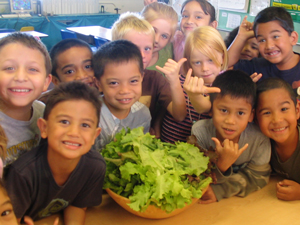 “Re-Growing Community Food Systems” is the theme of the Hawai‘i Farm to School and School Garden Hui’s upcoming Hawai‘i Farm to School Conference, to be held on O‘ahu this October to coincide with National Farm to School Month. The daylong event will bring together stakeholders from across the islands to facilitate discussions about increasing the supply, distribution, procurement, and awareness of locally grown food for Hawai‘i’s schools.
“Re-Growing Community Food Systems” is the theme of the Hawai‘i Farm to School and School Garden Hui’s upcoming Hawai‘i Farm to School Conference, to be held on O‘ahu this October to coincide with National Farm to School Month. The daylong event will bring together stakeholders from across the islands to facilitate discussions about increasing the supply, distribution, procurement, and awareness of locally grown food for Hawai‘i’s schools.
Presented by the Hawai‘i Farm to School and School Garden Hui and The Kohala Center, the Hawai‘i Farm to School Conference will be held at Kamehameha Schools’ Kapālama Campus in Honolulu on Friday, October 3 from 7:30 a.m. to 4:30 p.m. The conference agenda and registration are available online at hif2sc.eventbrite.com or by calling The Kohala Center at 808-887-6411. Conference sponsors include Kamehameha Schools, Kōkua Hawai‘i Foundation, Slow Food of Hawai‘i, the Johnson Ohana Charitable Foundation, and the U.S. Department of Agriculture (USDA) Farm to School Program.
The farm to school movement has the power to effect meaningful food systems change across Hawai‘i by supporting the state’s agricultural sector through expanded markets, increasing youth and community interest and involvement, and improving public health through greater access to and consumption of fresh fruits and vegetables. Additionally, farm to school programs have been shown to raise academic achievement, increase physical activity, and improve behavior among students.
“Farm to school is a local, national, and international movement that is simultaneously making positive and significant strides in the areas of agriculture, education, and health,” said Hawai‘i Farm to School and School Garden Hui coordinator Lydi Morgan Bernal. “This conference will promote the knowledge and best practices needed to develop and sustain a statewide farm to school program to re-grow Hawai‘i’s agricultural economy, future farmers, and healthy schools and communities.”
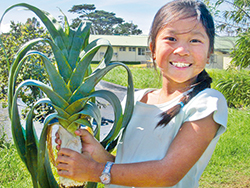 Keynote speaker Kacie O’Brien, farm to school regional lead for the Western Region of the USDA Food and Nutrition Service, will provide federal-level guidance and support for strengthening Hawai‘i’s farm to school efforts. Featured panelists include Hawai‘i Department of Agriculture chair Scott Enright, state procurement administrator Sarah Allen, Hawai‘i Department of Education school food services branch director Glenna Owens, and other distinguished leaders from across the state. Slow Food of Hawai‘i and many of O‘ahu’s local farmers and chefs will provide an “‘ono and pono” breakfast, and Hale Kealoha ‘Ai Pono will offer attendees a model school lunch featuring fresh, locally sourced ingredients.
Keynote speaker Kacie O’Brien, farm to school regional lead for the Western Region of the USDA Food and Nutrition Service, will provide federal-level guidance and support for strengthening Hawai‘i’s farm to school efforts. Featured panelists include Hawai‘i Department of Agriculture chair Scott Enright, state procurement administrator Sarah Allen, Hawai‘i Department of Education school food services branch director Glenna Owens, and other distinguished leaders from across the state. Slow Food of Hawai‘i and many of O‘ahu’s local farmers and chefs will provide an “‘ono and pono” breakfast, and Hale Kealoha ‘Ai Pono will offer attendees a model school lunch featuring fresh, locally sourced ingredients.
Two scholarships programs are available to help offset conference registration fees and travel costs. Educators and students may apply for scholarships of up to $200 per person (total of up to $1,000 per school) from the Kōkua Hawai‘i Foundation for reimbursement of conference registration fees and/or neighbor island flights and rental cars as needed. For non-educators, a limited number of conference registration scholarships of $50 each are available. The application deadline for both scholarship programs is Monday, September 15.
Kōkua Hawai‘i Foundation will also be coordinating visits to farm to school sites on O‘ahu on Saturday, October 4. Attendees interested in the site visits may contact the Foundation at info@kokuahawaiifoundation.org. Farm to school site visits will also be offered statewide throughout National Farm to School Month.
For more information about the Hawai‘i Farm to School Conference, email Lydi Morgan Bernal at schoolgardenhui@kohalacenter.org or call 808-887-6411.
Fall Book Talks and Spring Nature Walks announced for Circle of Friends
Members of The Kohala Center’s Circle of Friends not only support our ‘āina-based programs for community well-being, they also get to participate in exclusive events designed especially for them. This fall we’re inviting our Circle of Friends to three provocative Book Talks, followed in the spring by evocative Nature Walks through some of Hawai‘i Island’s most breathtaking native forests.
The Kohala Center’s Circle of Friends is open to supporters who donate $100 or more per year to The Center or any of its programs. To become a member of our Circle of Friends or to renew your membership, visit kohalacenter.org/circle-of-friends or contact Cortney Okumura at 808-887-6411.
Three of The Kohala Center’s Mellon-Hawai’i Doctoral and Postdoctoral Fellows, considered among Hawai‘i’s preeminent writers and thinkers, will lead the Book Talks, which will be held at the Jacaranda Inn in Waimea. Dr. Keao NeSmith kicks off the series on Saturday, September 20 with a reading of Ke Keiki Ali‘i Li‘ili‘i, his Hawaiian translation of the classic children’s book The Little Prince. On Saturday, October 4, Dr. Noelani Goodyear-Ka‘ōpua will read from and lead a discussion about her latest book A Nation Rising: Hawaiian Movements for Life, Land, and Sovereignty, which chronicles the history of the Hawaiian sovereignty movement from the 1970s to the present; she will be joined by one of her co-editors, Dr. Erin Kahunawaikaʻala Wright. Dr. Kamanamaikalani Beamer rounds out the Book Talks on Saturday, November 1 with readings from and discussion of his new work No Mākou Ka Mana: Liberating the Nation, which examines how the Hawaiian Kingdom’s ruling ali‘i (chiefs) exercised their own agency and selectively appropriated Western tools and knowledge to strengthen and maintain the lāhui (Hawaiian people).
The Book Talks are sponsored in part by Hilo Bay Books and Kona Bay Books, and will be followed by tea service featuring locally grown teas from Mauna Kea Tea and Māla‘ai: The Culinary Garden of Waimea Middle School, as well as locally baked refreshments by Sandwich Isle Bread Company.
In the spring of 2015, wildlife biologist and award-winning photographer Jack Jeffrey will lead three Nature Walks through some of Hawai‘i Island’s most stunning and magical forests. An expert on native flora and fauna, Jeffrey will guide participants on a two-and-a-half-mile birdwatching adventure along the Pu‘u ‘Ō‘ō Trail on Saturday, February 21; a two-mile expedition into the Maulua Tract of Hakalau Forest National Wildlife Refuge on Saturday, April 25; and a nature photography clinic and hike in the Pu‘u Pili Biodiversity Preserve on Kohala Mountain on Saturday, May 23.
Admission to each of the Book Talks is $15 per person and open to all current members of our Circle of Friends. Nature Walks are each $25 per person and include lunch ($50 per person for Hakalau, which includes four-wheel-drive transportation to and from the Refuge). Circle of Friends members may register and bring up to two guests to each event.
Space is limited at these intimate gatherings, so advance registration is encouraged. For more information and to purchase tickets, visit cof14.eventbrite.com or call The Kohala Center at 808-887-6411.
Kahalu‘u Bay Education Center exceeds fundraising goal
In less than a year, Kahalu‘u Bay Education Center successfully reached its fundraising goal of $60,000 to purchase a new mobile education unit. The local community’s generosity will give the center a much-needed upgrade from the weather-beaten van that has served as the program’s home base for the past three years.
With a length of 25 feet, the new mobile unit will equip the Kahalu‘u Bay Education Center (KBEC) team with ample space to support the 52,000 visitors they serve each year at the park, a number which is expected to grow with the addition of the new vehicle. The inside of the mobile unit will house educational exhibits and snorkel gear rentals, while the exterior will sport a full-body wrap displaying photos, educational information, and the names of supporters who contributed to the fundraising effort. KBEC is working with vendor FoodCart USA and shipping company Matson Navigation Co. to get the new vehicle to Hawai‘i Island by October of this year. Upon arrival, the interior of the new center will be customized to streamline KBEC operations and enhance visitors’ experiences. The new mobile education unit is expected to be in service by January 1, 2015.
The campaign to raise funds for the new mobile unit is an exemplary display of the power of community collaboration and support. The $60,000 needed to purchase and renovate the interior of the mobile unit was generously offered from individuals throughout the community, including local businesses, long-time supporters, residents, volunteers, and visitors. One notable contribution came from Elizabeth Nakayama, a longtime supporter of The Kohala Center, who donated a beautiful homemade quilt—valued at $800—to be given away in a “lucky number” drawing. More than 300 tickets were sold at $5 apiece, and lucky ReefTeach volunteer June van Leynseele won the quilt in the drawing held on July 31.
Another generous contribution came from local shipping company Matson, which offered to cover the complete cost of shipping the mobile unit from Long Beach, California, to Kawaihae Harbor this fall. Thanks to Russell Chin in Matson’s Hilo office, KBEC will save nearly $8,000 in shipping charges. In a conversation with KBEC director Cindi Punihaole, Chin explained that Matson’s donation was the company’s way of acknowledging the important work that The Kohala Center is doing for the community. As Punihaole put it, “It’s all about giving back.”
Looking ahead, KBEC has its sights set far beyond the new mobile education unit: the upgraded center is a stepping stone in a ten-year contract with the County of Hawai‘i to build a permanent education center at the park, at which point the mobile unit will become an outreach tool traveling to Hawai‘i Island schools and communities. In the meantime, KBEC and The Kohala Center are extremely grateful for the community support that set the wheels in motion to make this new mobile education unit a reality.
It’s never too late to support a brighter future for Kahalu‘u Bay and Beach Park. To donate to KBEC, visit kohalacenter.org/donate or call The Kohala Center at 808-887-6411.
Microloan program launched to support Hawai‘i Island food producers
The rise of online crowdfunding is helping small business owners and entrepreneurs raise capital by connecting with investors around the world and breaking through old barriers. Thanks to a Hawai‘i Island farmer and agricultural leader, the County of Hawai‘i and The Kohala Center have teamed up to engage the crowdfunding approach to support local food producers.
 In 2013, Captain Cook farmer Tane Datta received a $2,500 loan from Kiva Zip—a pilot program of Kiva.org, the world’s first and largest non-profit micro-lending website—to finance a new roof on a greenhouse that had deteriorated to the point of being detrimental to crops due to leaks and loss of quality light.
In 2013, Captain Cook farmer Tane Datta received a $2,500 loan from Kiva Zip—a pilot program of Kiva.org, the world’s first and largest non-profit micro-lending website—to finance a new roof on a greenhouse that had deteriorated to the point of being detrimental to crops due to leaks and loss of quality light.
Datta raised his funding in four days from 74 people across the globe in Asia, Europe, North America, and Hawai‘i.
As president of Adaptations, Inc., a marketing and distribution company that supplies all the islands with locally grown food from more than 100 farmers, Datta quickly recognized the potential of crowdfunding for fellow producers. He also realized the possibility of leveraging the funding opportunity to stimulate local food production.
“Almost all local cultures, clans, and families have ways of helping each other,” Datta said. “Everyone on the island appreciates locally produced food, community, and the spirit of aloha. Kiva Zip offers all of us the structure to bring our natural tendencies to reach out to each other into a social media format that can tangibly support island-wide food self-sufficiency.”
Conversations soon followed with the Hawai‘i County Agriculture Advisory Commission (which Datta chairs), Mayor Billy Kenoi, the County of Hawai‘i Office of Research and Development, and The Kohala Center. The result: the Hawai‘i Island Food Producers Fund, created by The Kohala Center with a $25,000 grant from the County of Hawai‘i.
“Kiva Zip’s ability to connect farmers in Hawai‘i with thousands of lenders around the world is a very exciting opportunity for us,” said Kiva Zip representative Justin Renfro. “Farmers like Tane exemplify the spirit of Kiva Zip: to empower good people to invest in the betterment of themselves, their families, and their communities.”
U.S. small businesses consistently report access to capital as a considerable barrier to growth. Rather than using traditional lending practices, Kiva Zip takes an innovative approach that relies on social capital and considers factors such as a borrower’s character and trust network, rather than their credit score, collateral, or cash flows, in making underwriting decisions. Through Kiva Zip, individual lenders around the world collectively “crowd fund” entrepreneurs and small businesses that are typically excluded from conventional lending avenues yet have significant social impact potential. By lending $5 or more, lenders collectively provide interest-free loans up to $5,000 (and up to $10,000 for farmers). This helps small business owners while offering individual investors an opportunity to actively support the social changes they want to see globally and locally.
The new fund provides 0% interest loans to Hawai‘i Island food producers through Kiva Zip and matches Kiva Zip loans dollar for dollar. Farmers and food processors utilizing at least one Hawai‘i-grown ingredient are eligible for the program. The Fund will revolve with Kiva Zip until exhausted, allowing the County’s initial grant of $25,000 to generate up to $275,000 in loans to local food producers.
Kiva Zip has been increasingly focused on supporting farmers and food producers because of their popularity amongst Kiva Zip lenders and high repayment rate. In 2014, lenders supported more than 200 farmers and food producers nationwide.
“Mayor Kenoi and his administration, the AAC, and The Kohala Center have been instrumental in providing funding that I hope will be a catalyst for the rest of the agricultural community,” Datta said. “I hope many others will join this effort as borrowers, lenders, trustees and, most importantly, as healthy eaters of local food.”
Individuals and organizations can support local food producers by becoming a Kiva Zip lender or trustee. Trustees factor heavily in the overall loan process, as Kiva Zip requires borrowers to have a trustee who can publicly vouch for the borrower’s character and support their business throughout the loan term. Trustees have no financial or legal liability for Kiva Zip loans.
Trustees can include individuals, small businesses, neighborhood associations, religious groups, student groups, professors, nonprofits, mentors, retail outlets, suppliers, small business development centers, economic development corporations, and startup incubators. For information on becoming a lender, visit zip.kiva.org/loans. For information on becoming a trustee, visit zip.kiva.org/trustees.
Kiva Zip accepts loan applications online at borrowers.kivazip.org. For more information on the Hawai‘i Island Food Producers Fund, please visit kohalacenter.org/microloan-kiva.


